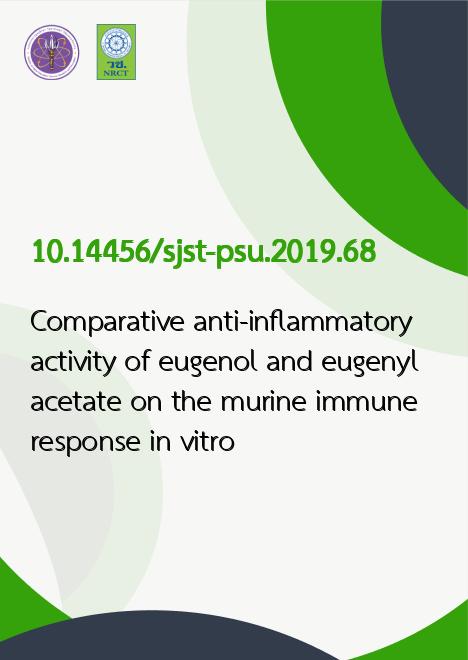
|
Comparative anti-inflammatory activity of eugenol and eugenyl acetate on the murine immune response in vitro |
|---|---|
| รหัสดีโอไอ | |
| Creator | 1. Aurasorn Saraphanchotiwitthaya 2. Nantaka Khorana 3. Pattana Sripalakit |
| Title | Comparative anti-inflammatory activity of eugenol and eugenyl acetate on the murine immune response in vitro |
| Publisher | Research and Development Office, Prince of Songkla University |
| Publication Year | 2562 |
| Journal Title | Songklanakarin Journal of Science and Technology |
| Journal Vol. | 41 |
| Journal No. | 3 |
| Page no. | 641-648 |
| Keyword | eugenol, eugenyl acetate, macrophage phagocytosis, splenocyte proliferation, cytokine |
| URL Website | http://rdo.psu.ac.th/sjstweb/index.php |
| ISSN | 0125-3395 |
| Abstract | The utility of eugenol, a naturally occurring phenolic compound, for various applications is limited due to its unfavorable properties. Thus, eugenyl acetate is under consideration as a substitute. The immunomodulatory activity of eugenyl acetate compared to eugenol was investigated. Eugenyl acetate stimulated oxidative burst release from macrophages much more than eugenol. Eugenol and eugenyl acetate similarly suppressed B-cell proliferation through the T-cell independent pathway, the same as lipopolysaccharide, as well as the T-cell dependent pathway, the same as pokeweed mitogen. Eugenol effectively stimulated T-cell proliferation more than eugenyl acetate through the same pathway as concanavalin A. Moreover, both eugenol and eugenyl acetate showed similar maximal activity in inhibiting interferon ? (IFN-?) and interleukin-2 (IL-2) production and stimulating IL-10 secretion. Our findings suggested that eugenyl acetate might be used as a substitute for or accompany eugenol as a potential therapeutic agent in treating inflammatory diseases and thereby decrease the potential high dose toxicity of eugenol. |
